If you suffer from sensitive skin or eczema, it can be difficult to find a washing powder that’s right for you.
You don’t want your skin conditions to get in the way of a good quality washing powder, but you certainly don’t want to choose a washing powder that could cause irritation or allergic reactions.
A family with sensitive skin needs to be careful with what they’re putting into their washing machine.
So many people walk around all day uncomfortable and itchy and some may not even know this is thanks to their washing powder. This simply won’t do! We all have important things to do during the day and constant itching isn’t high up on the to-do list.
You don’t want your skin conditions to get in the way of a good quality washing powder, but you certainly don’t want to choose a washing powder that could cause irritation or allergic reactions.
If you or a family member suffer from sensitive skin or eczema, you’ll know it can be difficult to find a washing powder that is right for you.
A household with sensitive skin needs to be careful with what they’re putting into their washing machine, as heavily scented products or washing powder with SLS can set off allergic reactions and flare up skin conditions.
Thankfully, there are some great washing powders available for sensitive skin. However, not all washing powders that say they are good for sensitive skin really do much at all.
This means that you can spend months (and a small fortune) trying to find the right product for your family and get nowhere. Well, not any anymore.
With any luck, you’ll find the perfect washing powder for your family’s sensitive skin below.
The Best Washing Powders for Sensitive Skin in the UK
1. Ecover Zero Non Bio Sensitive Washing Powder
This washing powder from eco-friendly brand Ecover is specially formulated for people with sensitive skin.
It’s approved by Allergy UK, and users with allergies and eczema should be able to safely use it without any problems.
The ‘Zero’ in the name refers to the fact that it contains zero fragrances and enzymes—the two main culprits that can cause skin irritation from washing powders.
Many people with sensitive skin find that this product does a great job at cleaning their clothes without causing flare-ups and allergic reactions.
As well as being kind to sensitive and dry skin, Ecover Zero also has impressive sustainability and ethical credentials. It is plant based and biodegradable, and comes in recyclable cardboard packaging.
It’s also not tested on animals, so it’s a vegan and cruelty-free choice.
2. Persil Non-Bio Washing Powder
Persil’s non-bio washing powder is designed to remove even the most stubborn of stains whilst still being gentle on sensitive skin and delicate clothes, even when used in quick or cool wash cycles.
This non-bio washing powder proves to be great value for money, and each box lasts a surprisingly long time.
This product has a subtle scent, and many people with eczema find that they can use it without any irritation.
It’s dermatologically tested and recognised by the British Skin Foundation.
If sustainability is a key consideration for your family, you’ll love that this washing powder uses only biodegradable ingredients, and the box is 100% recyclable too.
Users find that this washing powder achieves great performance on all manner of fabric and stain types.
Despite performing well on even caked-on stains, this detergent is still gentle enough that it is ideal for sensitive skin, even babies’ skin.
3. Molly Suds Original Laundry Powder
This washing powder is made by American brand Molly Suds, who focus on creating laundry products free from toxic ingredients.
It’s specially formulated to be ultra-safe, not just for those with sensitive skin but for anyone worried about the harsh chemicals found in many laundry products.
Molly Suds Original Laundry Powder can be bought in unscented form or in a range of lightly scented options.
The main ingredients are sodium carbonate (also known as washing soda), and sodium bicarbonate (bicarbonate of soda).
Most people find that this laundry powder is ideal for sensitive skin and gentle enough for washing baby clothes.
It’s also cruelty free and vegan, so it’s an ethical option.
One downside to this product is that it is very expensive compared to most other laundry detergents.
4. Bio-D Non-Bio Concentrated Washing Powder
Bio-D’s non-bio washing powder is Allergy UK Certified, meaning that is should be safe for those with allergies and eczema.
It doesn’t contain any fragrances or enzymes, and is also free from harsh artificial chemicals.
This product is made in the UK using natural ingredients, and is biodegradable. The packaging is 100% recyclable, so it’s very eco friendly.
Bio-D washing powder is also both and cruelty free, and is approved by both the Cruelty Free Society and the Vegan Society.
Most users find that this product does a good job at cleaning clothes without causing any flare-ups, allergic reactions or itchiness.
5. Fairy Non-Bio Powder
Fairy non-bio washing powder is available in a big 140-wash box, offering good value for money.
According to Fairy, the brand was voted the number 1 brand for sensitive skin laundry products by an online panel of 3347 females aged 18-70.
This product has the Skin Health Alliance seal, meaning it has been independently verified as safe for the skin.
Fairy’s non-bio powder does contain some fragrances, so it’s not ideal if you are sensitive to perfumes. However, most people find it is a good choice for sensitive skin.
Tips for Choosing Washing Powder for Sensitive Skin
1. Always read the label!
If you have a skin condition, you’re probably used to checking the label on anything your skin will come into contact in – anything to avoid irritation!
When checking the label on washing powders look for the words ‘hypoallergenic’ or ‘non-bio’.
The word ‘hypoallergenic’ is used to refer to products that are less likely than average to cause an allergic reaction. It doesn’t mean they are guaranteed not to cause reactions, but they are certainly a safer choice.
‘Non-bio’ refers to products that not contain enzymes. Enzymes can irritate the skin, so avoiding products with them should help to keep irritation at bay.
2. Go for fragrance free
Although avoiding the enzymes in biological laundry detergent is a good idea, the main causes of allergic reactions in laundry detergent are actually fragrances, according to dermatologists Rosemary Nixon and Claire Ronaldson. Choose a fragrance-free laundry detergent if you want to avoid skin reactions.
3. Know what your sensitivities are
Brighteners, bleach, petrochemicals and phosphates – all of these could cause skin irritation. If you see a doctor about your skin condition, ask them which particular ingredients you’re sensitive too and stay away from these at all costs.
Alternatively, a trial and improvement method can work too – if a product doesn’t work for you, try a new one! Keep testing different products until you find the right one for you.
4. Look at the other products you use
If you use other skincare products that work well for you, take a look at their label. Your sensitive-skin moisturiser or sun cream might give you a clue as to what you should look out for when finding the perfect washing powder for you.
5. Avoid fabric softeners
Most fabric softeners contain chemicals and fragrances that could be harmful to sensitive and allergy prone skin. The best thing to do if you do have sensitivity is to avoid fabric softeners all together, though some hypoallergenic fabric softeners are available
Top tip: Substitute fabric softener for white vinegar which can help remove traces of hard water residue and soften your clothes without affecting your skin.
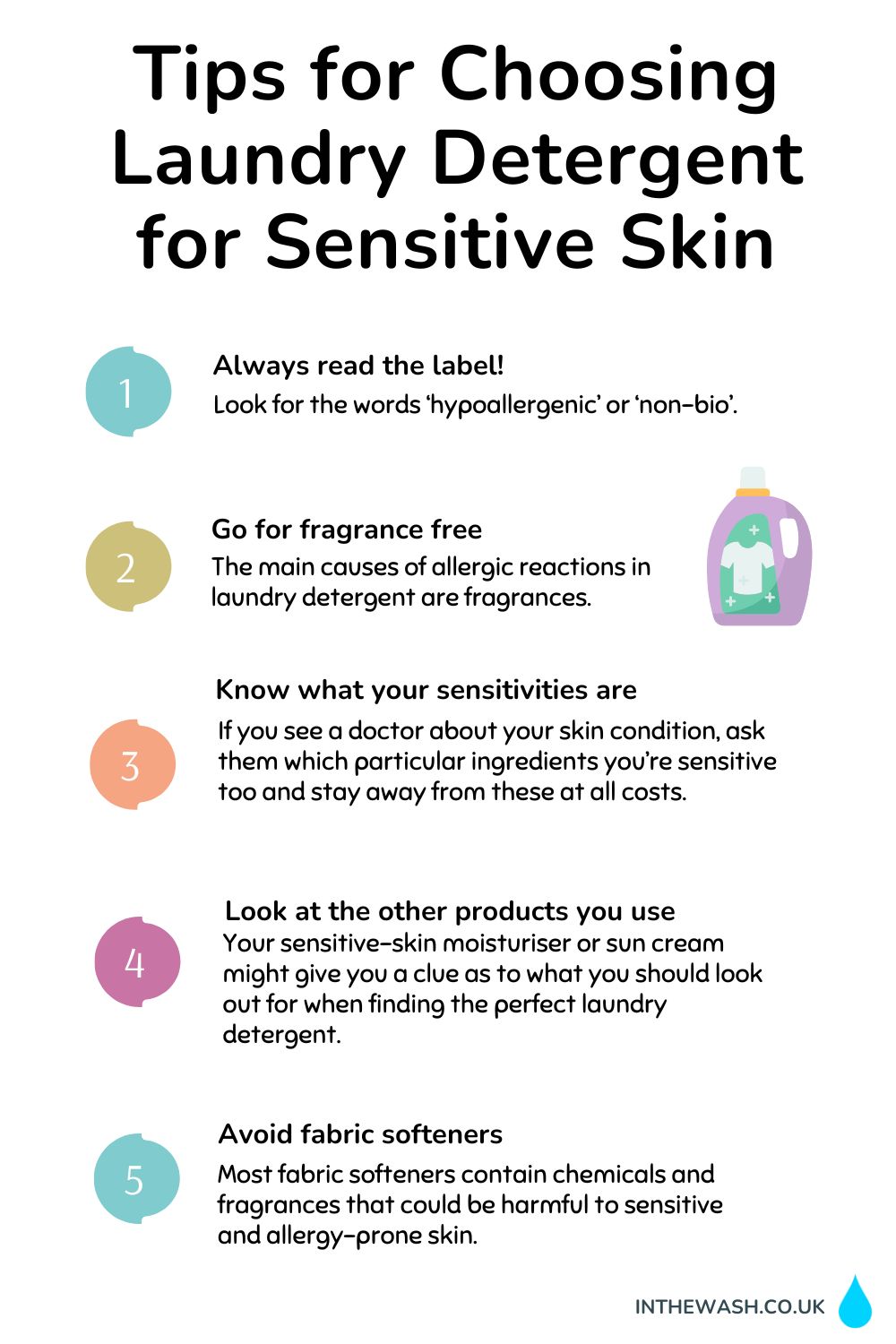
Laundry Tips for People with Sensitive Skin
Here are a few tips to help reduce the effect of laundry detergent on your skin:
- Give your clothes an extra rinse. If your washing machine has the option of an extra rinse cycle, use this to remove laundry detergent before your clothes come out of the machine.
- Don’t overuse laundry detergent. Washing powder is more concentrated than it used to be, so you don’t need use much. Check the instructions on the product’s packaging and make sure you’re using the correct amount—and no more.
- Experiment with different laundry detergents. It might take a few tries before you find the right detergent. Look for washing powders that are free from fragrances.
Signs You’re Allergic to Your Laundry Detergent
These are a few symptoms of an allergic reaction to washing powder or laundry detergent:
- Itchy rashes forming on the skin after putting on newly washed items for the first time.
- Rashes that form within 48 hours after exposure.
- Skin becomes inflamed, dry or cracked, and/or changes colour
An allergic reaction to a particular substance, for example a particular ingredient in laundry detergent, is a type of eczema known as contact dermatitis. You can read more about it and its symptoms on the NHS website.
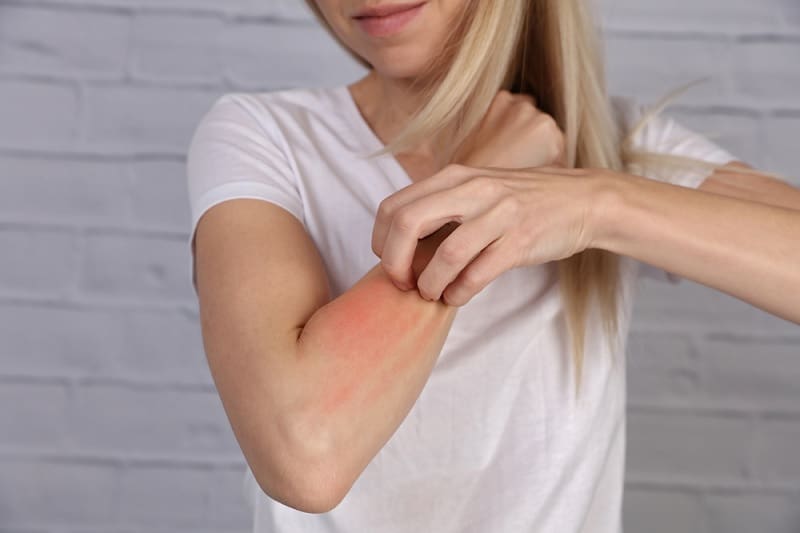
Which Ingredients Cause a Reaction?
If you think you’re allergic to your washing powder, the problem will be with a particular ingredient rather than the washing powder as a whole.
Some of the most common allergens in laundry detergents include the following:
- Fragrances – According to many dermatologists, fragrances are the most likely cause of a skin reaction to laundry detergent. It can be hard to identify whether or not a washing powder contains fragrances, and exactly what ingredients are used to produce the fragrances. The easy way around this is to look for products that are explicitly labelled as ‘fragrance free’.
- Dyes – Dyes can contain allergens, so it’s best to avoid laundry detergents that contain them.
- Enzymes – Biological laundry detergent contains enzymes, which can irritate the skin.
- Sodium lauryl sulphate – This ingredient, often referred to by its initials SLS, can cause dry skin by interfering with the natural oils on your skin.
Consider buying a hypoallergenic laundry detergent if you suffer from an allergic reaction. The ‘hypo’ in hypoallergenic essentially means ‘less’, so a hypoallergenic laundry detergent is designed with as few potential allergens as possible.
How to Do Laundry if Your Baby Has Sensitive Skin
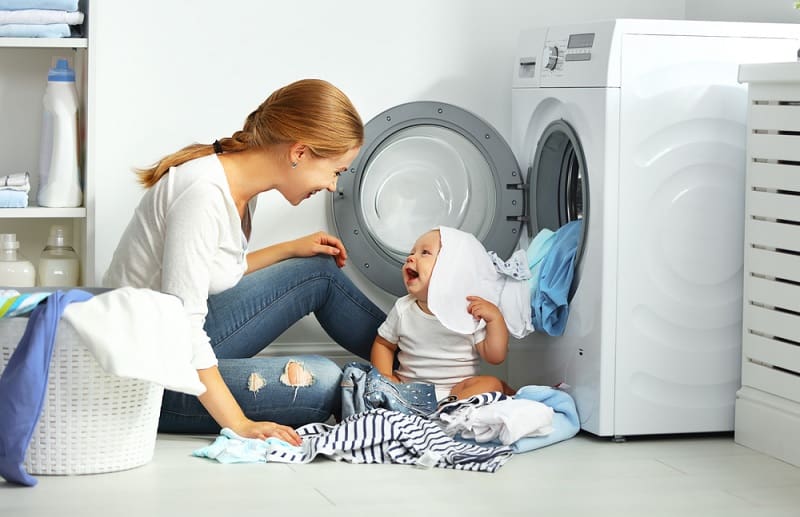
If your baby has sensitive skin, it’s likely that you’ll be concerned about using laundry detergents that could potentially make your little one’s skin slightly worse.
There are many different brands of laundry detergent out there, and fabric conditioner too.
So how do you do your laundry if your baby has sensitive skin, and how can you stay away from those detergents that could irritate skin that is prone to eczema?
We’re going to take a look at this now.
How your baby’s skin reacts to laundry detergents
Your baby’s skin may be sensitive or even be prone to eczema because of the laundry detergent residue that can be present in the garments after washing.
In fact, if the clothes come out of your washing machine a little stiff it could be due to the build-up of detergents in the fabric. 2% of the weight of the garment could be made up of the detergent you use, which is a significant amount.
There is another reason why your little one reacts to laundry detergents. Even some of the most sensitive detergents out there contain chemicals and other additives that could be quite irritating towards your baby’s skin.
These additives include:
- Diethyl phthalate
- Dibutyl phthalate
- Dimethylphthalate
These additives are often used in laundry detergents to help them smell nice, and although most of us like the smell of the detergent we use, the phthalates could be damaging your baby’s skin.
But phthalates are not the only things you should consider staying away from; you may also want to reduce your use of stain removers as they tend to be highly concentrated and can simply be a stronger version of your laundry detergent.
Again, stain removers can build up in your baby’s clothing, so you may want to refrain from using them as much as you can.
If you do need to use a stain remover, we recommend that you soak the clothing in bicarbonate of soda and water, and place them straight into the wash.
You may also want to think about using laundry detergents and stain removers that are allergy-friendly as they can help to reduce outbreaks of eczema.
Tips for minimising skin irritation
The good news is there’s a real solution to your baby’s sensitive skin issue, and it’s one that you and your whole family can work around relatively easily. Here are just a few suggestions that could make a huge difference:
- Reduce the build-up of detergents by rinsing the clothes again, once the original wash cycle has finished. Once the additional rinse cycle has been completed, use a spin cycle to wash out the hidden detergent.
- Limit your use of laundry detergent. You don’t always need to use as much detergent as the manufacturer tells you, and in most cases, you can probably use half the amount. If your clothes are very dirty you may want to think about adding some bicarbonate of soda to the load. 1 or 2 tablespoons of bicarb will usually do the trick.
- You may want to consider purchasing eczema-friendly laundry liquid. Products such as these can usually be found online or in some health food stores, but they can be a little expensive.
- Avoid using laundry detergents and fabric conditioners that are heavily scented as the phthalates that are found in the scents can cause irritation.
- Consider using soap flakes instead of detergent. Soap flakes tend to be a lot less irritable to the skin, but your little one’s clothes will need an extra rinse and spin cycle as there will be some leftover residue at the end of the cycle.
While every baby reacts differently to laundry detergent, there are some steps you can take to minimise skin irritation.
If you are concerned about your little one’s skin, please speak to your doctor as they may have some useful advice.
With a little bit of effort and with a small change to your laundry habits you too could find that your baby’s sensitive skin is no longer an issue.
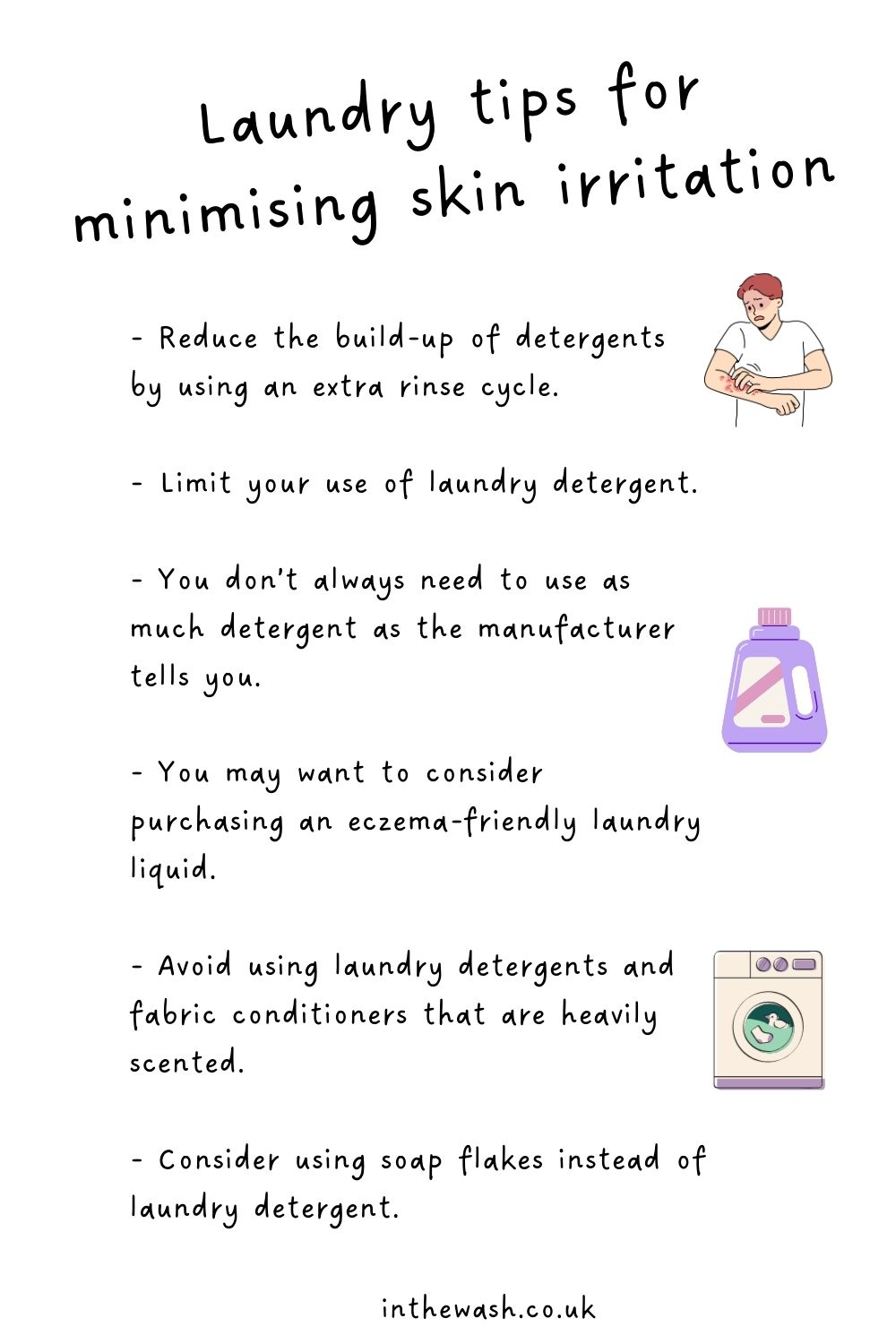
Conclusion
If we had to pick just one washing powder to recommend for people with sensitive skin, it would be Ecover Zero Non Bio. Not only is it Allergy UK approved and free from enzymes and fragrances, it’s also an environmentally friendly choice. Most users find it cleans laundry very well without causing any kind of irritation or skin reaction.

In The Wash is your guide to the best laundry and cleaning products, tips and tricks. Our mission is to solve the UK’s cleaning and laundry dilemmas!
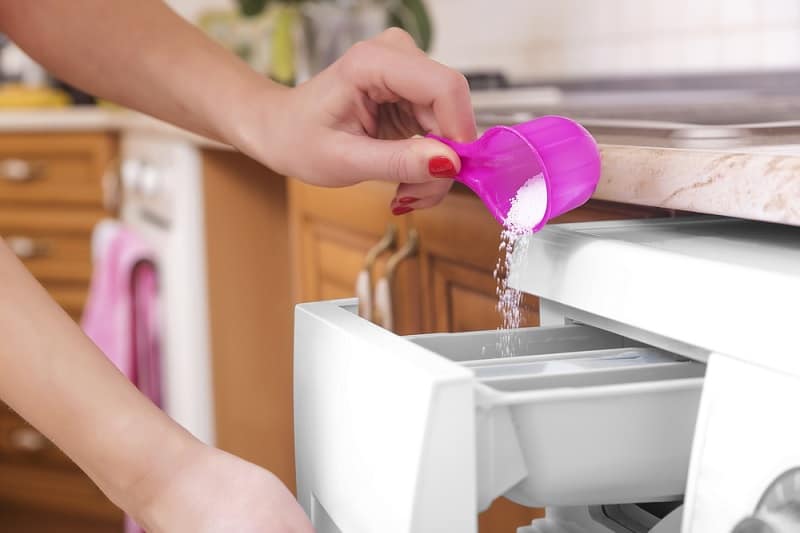



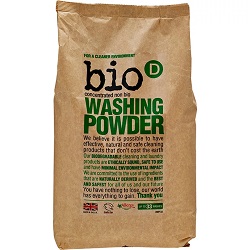


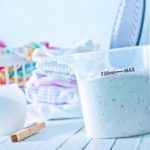




My wife has eczema, my late mother did too and when our daughter as baby (now 9yrs) had rashes similar to eczema, we decided to find what we can do to change things around.
Here are things that I found to affect:
-Perfumes in the washing powder/liquid irritate the skin
-Usually, most fabric softeners irritate the skin too
-Some powders contain zeolites, it is a type of clay-stone that is used to soften the water. This irritates the skin too.
-Bio powders aren’t actually different than non-bio for sensitive skin. Usually, it is the perfumes and additional chemicals inside bio/non-bio that irritates the skin.
We’ve been using Caring Panda’s powder for 9 years now, and we will never change from it.
I hope that the short list above helps people with sensitive skin.
Regarding money saving: it costs 0,35£ per wash to use the powder, which is less than some sensitive skin powders.
Could it be a factor that the new ‘eco’ washing machines have cut the water usage so much that clothes are no longer rinsed properly?
Hi I have several things I think it could also be. People overfill their washing machines as per the instructions for each wash in the manual and wash on a quick and low temperature which is less water. So clothes do not get cleaned properly and then not rinsed properly Germs and bacteria are not killed off with the lower temperature either. I keep hearing that when people used to wash their clothes using at least a 60 temp wash and use powder and air them their were never as many allergies about . Don’t know if this was true but interesting though. I used to be tolerant of the original smell of most washing powder being super sensitive to smell causing migraine but now everything is perfumed then extra perfumed which is really bad for my head .I use washing crystals at the moment but still on the hunt for something a bit better for cleaning . So if anyone can suggest anything it will be greatly appreciated .